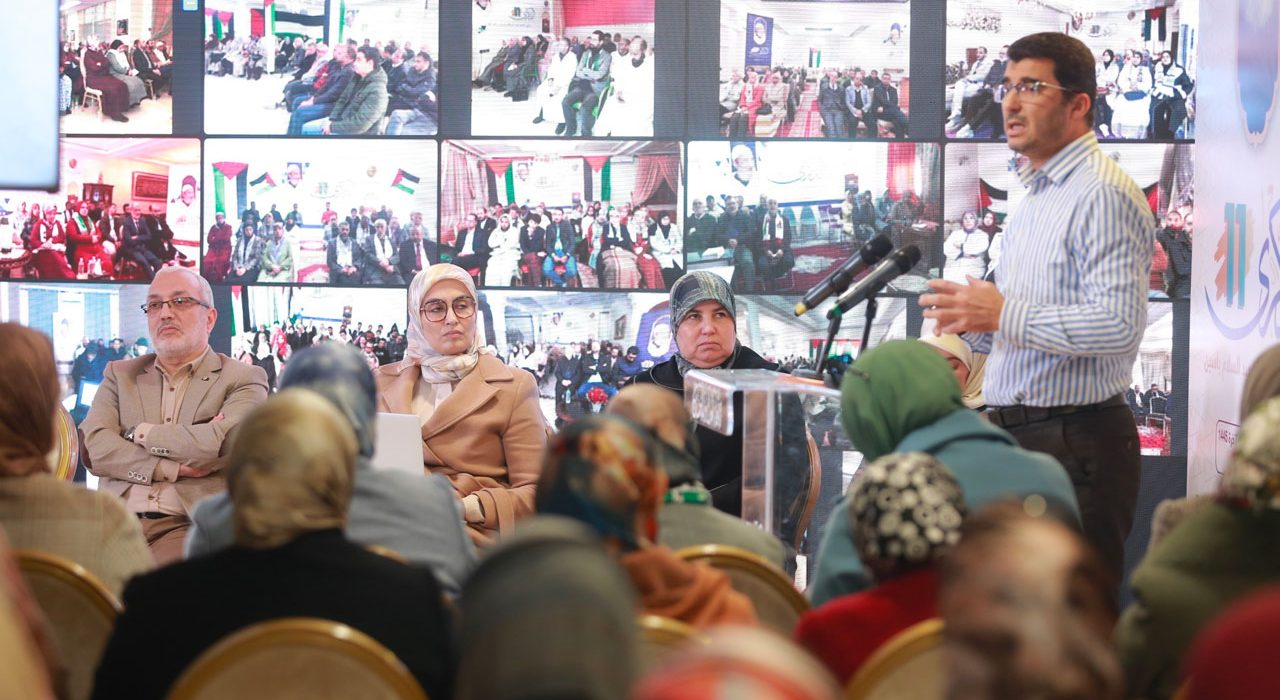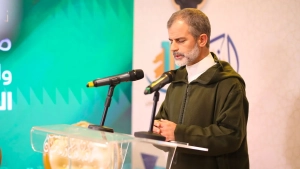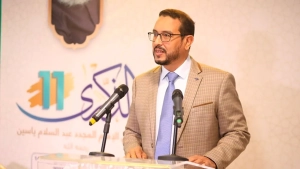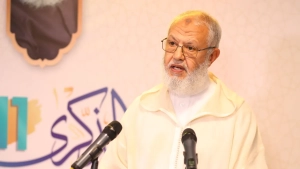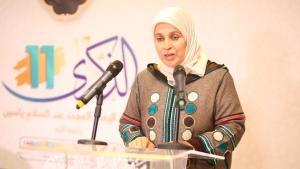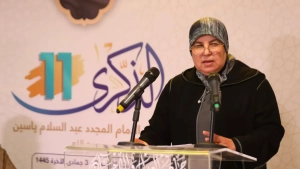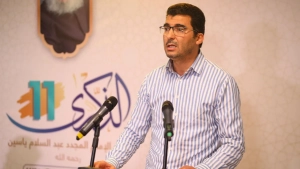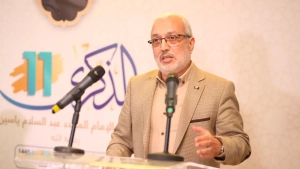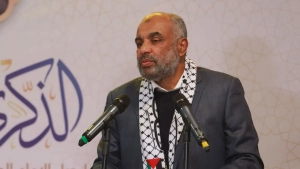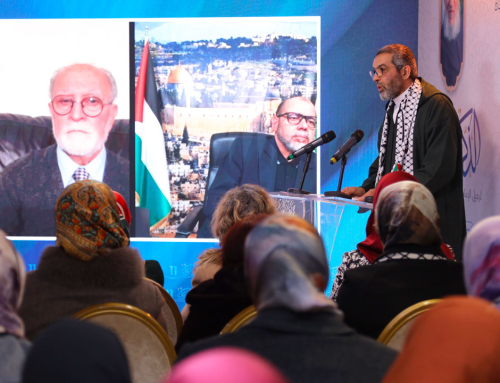Editorial Board
December 26, 2023
The 11th Commemoration of the passing of Imam Abdessalam Yassine, may God have mercy on him, continued on Sunday, the 3rd of Jumada Al-Akhirah, 1445 AH, corresponding to December 17, 2023, in the Moroccan city of Salé. The proceedings began with a recitation of some Quranic verses from Surah Ar-Rum by the esteemed reciter, Mr. Abderrahmane ben Taher.
In his opening remarks, Dr. Mounir El Jouri, the coordinator of the second day’s events, expressed his appreciation to all attendees. He underscored the significance of the Palestinian cause, the focal point of the inaugural symposium. Dr. El Jouri warmly welcomed the participants of the second symposium, titled “Family as an Institution and Social Cohesion: Challenges and Prospects.” The speakers were Ms. Thouraya El Boukili, a dedicated researcher in family issues; Dr. Abdellah Jbari, an esteemed scholar in Islamic studies; Dr. Bothaina Qarowi, the president of the Zahra Forum for Moroccan Women; and Dr. Said Akiour, a researcher in Islamic thought and contemporary philosophy.
Then, Ustadh Mohamed Barchi, a member of the Guidance Council of the Justice and Spirituality Movement, addressed the audience by shedding light on the adversities faced by the Palestinians, including the grim realities of killings and extermination. Notwithstanding these challenges, Ustadh Barchi underscored the steadfast faith of Palestinian families in the divine triumph of God. He metaphorically likened them to a well-established structure, highlighting the exceptional collaboration among their constituents—men, women, and children. These families, nurtured under the divine gaze of God guided by the principles of the Quran, and enveloped by the presence of God’s chosen ones, epitomize a sacred bond.
Ustadh Barchi then expounded upon the inherent purpose of human creation, emphasizing that humans are crafted in the best form. He elucidated that this purpose encompasses responsible stewardship of the earth, with success marked by goodness and righteousness, cautioning against the destructive consequences of injustice.
Emphasizing the paramount significance of fraternal bonds among Muslim believers, he referenced a Hadith of the Prophet Muhammad ﷺ: “The similitude of believers in regard to mutual love, affection, fellow-feeling is that of one body; when any limb of it aches, the whole body aches, because of sleeplessness and fever.” (Sunnah.com)
Ustadh Barchi asserted that individual well-being and societal stability hinge upon the health of the family unit. He referenced an insight from Imam Yassine, stating, “Through genuine love and intimate compassion, marital harmony is achieved through good faith, rightful action, and divine alignment with the human’s instinct. It is not the legal contract that brings stability to the household; rather, it is the harmony of intention and action. In other words, the stability of the household radiates throughout the broader society, which fosters a sense of community well-being.”
He cautioned against the subversion of the family, singling out parental disobedience as a principal threat. Expounding on the ethical conduct of Imam Abdessalam Yassine within his family, he shared the sentiments of Lady Khadija, Imam Yassine’s wife, who described him as an exemplary father. According to her account, he rejoiced in the birth of each child, engaging with them affectionately, regaling them with stories of the prophets, and instilling in them a love for prayer and Quranic memorization without imposing it upon them.
Furthermore, Ustadh Barchi outlined the risks confronting families, with tyranny, neglect, the erosion of the sanctity of marriage, and the promotion of forbidden relationships at the forefront. He underscored the need for personal self-improvement and collaborative efforts to thwart attacks aimed at dismantling families and impeding their role in shaping individuals and society.
In the end, Ustadh Barchi reminded the audience of the Quranic verse: “O humanity! Indeed, We created you from a male and a female, and made you into peoples and tribes so that you may ˹get to˺ know one another. Surely the most noble of you in the sight of God is the most righteous among you. God is truly All-Knowing, All-Aware” (Quran.com). He invoked the words of Imam Yassine, who stated, “The divine verse outlines the human development through stages: from male and female, God creates the human being. It is the embrace of the family, the warmth of motherhood, and the care of fatherhood, providing nourishment, security, and upbringing. Then it expands socially, encompassing the tribe and the nation. This natural state remains natural if humans progress to the maturity of mutual recognition and cooperation. Then to the dignity of belonging to God by acquiring piety and performing righteous deeds.”
Next, Ms. Assia Farhi moderated the symposium titled “Family as an Institution and Social Cohesion: Challenges and Prospects.” She underscored the pivotal importance of the family as the fundamental cornerstone of society, highlighting that the unity and strength of the broader community depend on the moral integrity of its foundational families.
Ms. Bothaina el Boukili: Family in a Changing World: Challenges and Means of Protection
The researcher, Thouraya, initiated her speech by clarifying the significance of the subject and addressing the profound transformations that the Family Institution has undergone, necessitating appropriate responses.
In her speech, Ms. Thouraya asserted that the safeguarding of the nation hinges on the strength of the community and the cultivation of righteous individuals. This, she emphasized, can only be achieved through attention to three dimensions: the religious, functional, and transformative dimensions. She further highlighted the need to pay attention to the integration of roles within the family, discussing the duality of ḥāfiẓīyya and qiwāma and connecting it to the ultimate purpose of worshiping God alone.
Ms. Thouraya illuminated the function of the family in Islam, emphasizing its role in graduating cohorts of righteous believers by nurturing their innate qualities, focusing on qualitative abundance, combating undesirable elements, and equipping children with a balanced upbringing to shape a promising future for the nation. However, she underscored obstacles impeding these significant family functions. Firstly, the globalization system contributes to the fragility of marital relationships, psychological violence, and emotional detachment. Secondly, cultural invasion focuses on obscuring Islamic beliefs, imposing a siege on religious education, while simultaneously reinforcing the principle of absolute freedom, dismantling the family structure, and advocating for absolute equality between males and females.
Following the identification of these obstacles, Ms. Thouraya, in her exploration of family issues, concluded with a set of practical measures contributing to the construction of the desired constructive family. These measures include internal family reform, the establishment of a comprehensive reformative project rooted in Islamic principles and open to successful human experiences, organizing collaborative work, activating the role of Islamic scholars, revisiting and adapting Islamic heritage to meet the requirements of reality, focusing on the development of beneficial educational curricula, and unleashing family potentials through mechanisms such as family rehabilitation, family mediation, and genuine care for children.
Dr. Abdellah Jbari: The Muslim Family: Challenges and Means of Protection
Dr. Abdellah Jbari commenced his speech by expressing gratitude for the gracious invitation from the Movement and extending condolences for its founder. The Islamic studies researcher approached his speech from two perspectives: the risks threatening Muslim families and ways of fortification. Regarding the first aspect, the speaker addressed three risks. Firstly, the external threat, characterized as powerful, organized, supported by international agreements with legal force, international supporting institutions, globalization programs, and technical projects. Issues within the family sphere, labeled as the “battlefield” by Friedman, were highlighted, such as premarital sex, abstinence, and reluctance towards childbirth. Secondly, the self-inflicted danger that restricts the family approach to a legal framework considered limited. The third peril is Westernization, adopted by the Moroccan elite, endorsing the superiority of Western civilization, promoting universal values in the family domain, which, according to the speaker, neglects some of the purposes of marriage.
Transitioning from identifying risks to methods of fortification, Dr. Jbari proposed three types:
- Sharia-based fortification: Rooted in pride for Islamic principles, this involves acquiring Islamic education through collaboration between Islamic scholars, the Islamic movement, and researchers. This collaboration requires an ongoing effort to reinterpret past scholarly opinions in their historical contexts, while also adapting to the contemporary context of modern states that should undertake social care in collaboration with various stakeholders.
- Cultural fortification: This involves taking pride in the family’s presence within Moroccan Arab and Amazigh cultures, utilizing art, theater, poetry, sports, and intellectual efforts from the elite to counter Western thought. It establishes how to deal with heritage to confront present risks.
- Value-based fortification: Going beyond legal frameworks, this fortification, described as “above the law,” does not negate the importance of legal approaches in addressing family issues. It finds its support in Quranic legislation in the family domain surrounded by values. This includes building marriages on affection and mercy, and ending them with divorce based on recognized values and kindness, without causing harm. Dr. Abdullah Jabari, an Islamic jurisprudence researcher, concluded by emphasizing the importance of values within families, which can only be addressed through the nurturing environments of education.
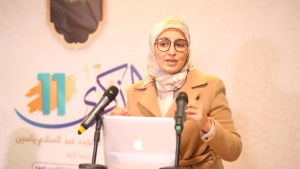
Dr. Bouthaina Qarori: The Family Institution and Social and Moral Transformations: An Explanatory Study
First, Dr. Qarori expressed her gratitude for the invitation and acknowledged the significance of the symposium’s topic, the professor of constitutional law emphasized its importance, highlighting the need for specialized studies to investigate the social and moral transformations. She compared the Islamic and Western concepts of family legislation, delving into the historical, social, and political contexts that shape these concepts. While the Western notion of equality emerged from the conflict between the monarchical and ecclesiastical systems, resulting in the “freedom or the authority of individual will” within civil law, the Islamic vision of family legislation is grounded in a comprehensive understanding of justice that goes beyond the superficial equality promoted in the West.
The speaker, the head of the “Zahra Forum for Moroccan Women,” further explored the challenges of legislation, questioning the desired model of law and contemplating how to think about social changes from within our context. She discussed the philosophical perspective that each society has its own laws, emphasizing the Islamic family legal framework as Quranic and dynamic, allowing judges to derive rulings based on presented cases and circumstances, aligning it closely with the Anglo-Saxon model that relies on practice in law production.
Additionally, she drew attention to the transformations affecting the family as an institution globally due to symbolic setbacks, changes in cultural and economic structures influenced by digitization, social media, capitalist dominance, and market-oriented consumption. These factors have influenced the function of families and family relationships, prompting her to present official statistics and percentages reflecting the social and economic status of Moroccan families, particularly women. This status represents a reflection of ongoing global changes and establishes a situation less favorable than what God intended based on the Quranic foundations of the family institution.
In conclusion, the university professor, passionate about family issues, emphasized the necessity of focusing on a solution that articulates a liberating vision from our various perspectives. She pointed out that scholars and their interpretative responsibilities should not freeze behind previous interpretations. Instead, they should engage in new interpretative efforts that address the challenges faced by family components in our contemporary reality.
Dr. Said Akiour: Values Ensuring Family and Social Cohesion
Dr. Said Akiour commenced his speech by expressing gratitude for the invitation and commending the chosen theme of the conference, which underscores the centrality of the family. He emphasized the family’s status as the oldest social institution known to humanity, necessitating discussions about it in various realms such as philosophy, sociology, politics, and civilization. The family, he asserted, is an integral part of a holistic system.
The researcher delved into the notion that the family serves as a lens through which society’s customs, threats, and risks can be identified. These risks, as he outlined, are diverse, stemming from various actors, influencers, and projects. He then expounded on two main dangers:
- Existence and Continuity of the Family: Dr. Akiour accentuated this risk with alarming Western indicators, warning of the potential extinction of families by certain organizations and French experts forecasting the decline by 2030. He also referenced Sweden’s attempts to address the rise in its aging population.
- Identity: The second major risk pertains to the targeting of the family worldwide, particularly the Muslim family, by Western intellectual systems of modernity and post-modernity (illicit relationships, deviance, individualism, etc.).
The scholar, with a keen interest in family and political issues, expanded on these risks, presenting interconnected perspectives: intellectual, political, and moral. He focused on the moral perspective, representing it with regulatory values:
- Value of Justice and Dignity: Improving the reality of families, providing the components of a decent life, and involving them in their countries’ wealth are strategies to counteract this risk.
- Values of Chastity and Virtue: As authentic Islamic values, efforts should be directed towards reviving and constructing them within families and schools, countering the immoral values of illicit pleasure and consumption.
- Values of Affection and Compassion: Through writing, creativity, and communication. These compound conceptual terms represent a bridge and an expressive thought. They represent a bridge that transcends happiness in worldly life to the one of the hereafter. In addition, they indicate stability and marital harmony.
- Values of Independence and Integration: Rejecting the idea that women belong to men, emphasizing their complementary roles and functions.
- Values of Mutual Assistance and Solidarity: Essential in family life, showcased by the contributions of Moroccan migrants during the COVID-19 pandemic and the Al Haouz earthquake.
Dr. Said Akiour concluded his speech by underscoring the family’s central role, prompting reflection on how to build, disseminate, and promote these values in society and the nation.
After that, the floor was opened for discussion, where some of the attendees contributed to enriching the topics and issues discussed in the intellectual symposium with necessary scientific additions, sound directions, and valuable observations.
After the conclusion of the symposium, the attendees gathered for a concluding statement on the second day of the eleventh commemoration. Ustadh Fathallah Aresalan, Deputy Secretary-General of the Justice and Spirituality movement, emphasized, “We do not merely commemorate the anniversary of Imam Abdessalam Yassine’s departure; rather, it is the anniversary that keeps us alive.” He reminded everyone that the Imam remains present with us through his guidance, writings, recorded speeches, and the values instilled in us by his emulation of the Prophet ﷺ. Ustadh Aresalan underlined that the Imam’s departure did not sever the connection between him and the community. The Movement spokesperson also highlighted the Imam’s frequent reminders about the Hereafter in every gathering and occasion.
Ustadh Aresalan reiterated the invitation to everyone to delve into the ideas of Imam Abdessalam Yassine on various issues, including family matters and Palestine. He highlighted some of the Imam’s insights that have proven valid over time, providing the Arab Spring as an example of that matter. He emphasized the necessity of consensus during transitional periods to break away from decades of corruption.
The second central symposium on family issues, part of the events commemorating the eleventh anniversary of the passing of Imam Abdessalam Yassine, concluded with a closing prayer and the recitation of Al-Fatiha by Ustadh Mohammed Barchi.



